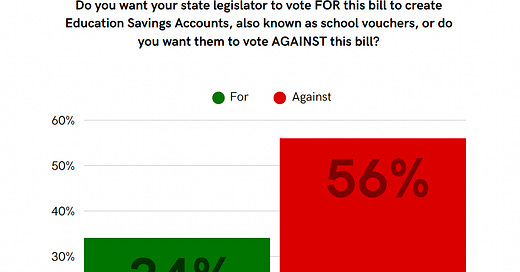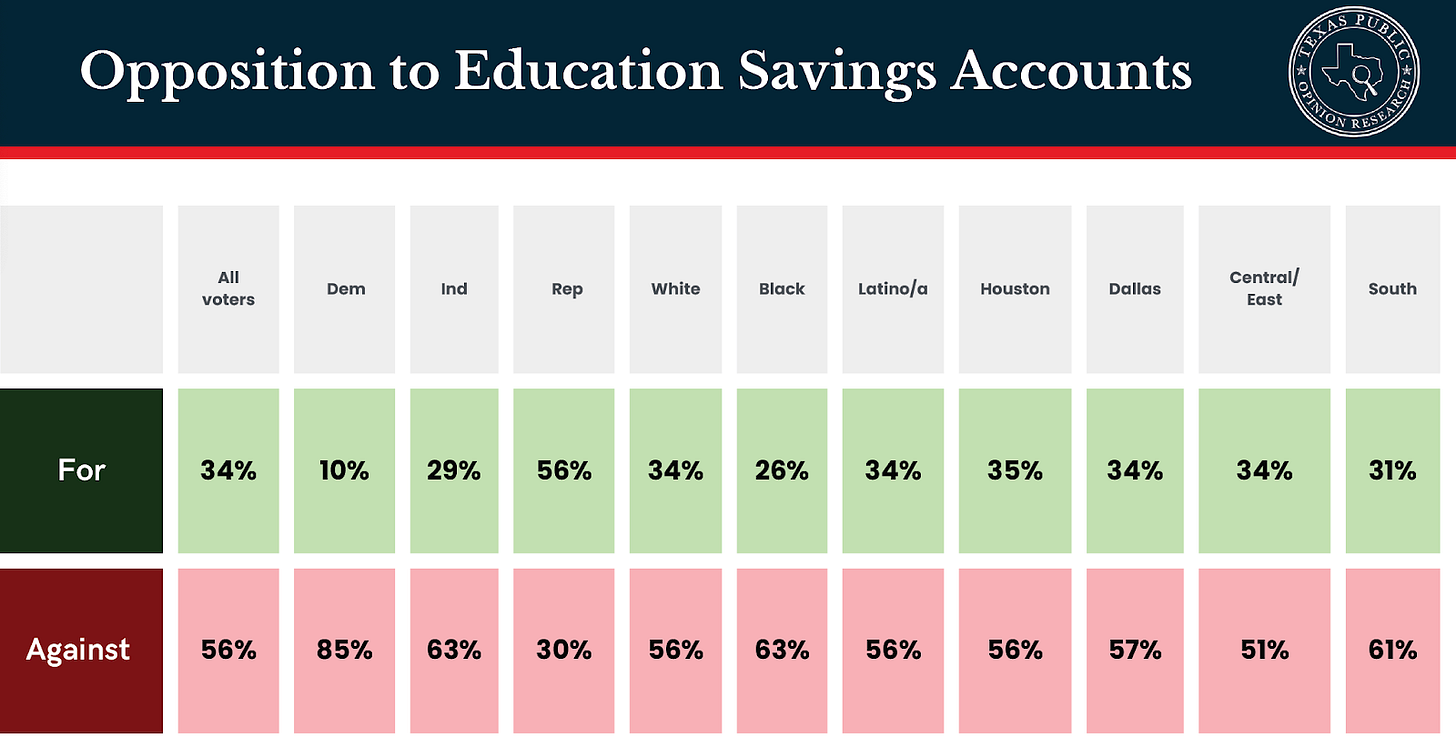Education and School Vouchers in Texas
A closer look at the Education Savings Accounts proposal on the table in the state legislature
Education and Vouchers
Hey y’all, welcome back! Today, we’re diving back into the findings from TPOR’s recent poll on 2025 state legislative issues in Texas and the 2026 Senate race. Specifically, we’re looking at voter sentiment around education in Texas and the school vouchers (known as Education Savings Accounts) proposal on the table in the state legislature.
Here are some of the key takeaways:
Asked which issues they believe are most important for Texas elected officials to focus on right now, 28% of voters say education and public schools—making it voters’ second-highest priority, after affordability and cost of living.
Only 34% of voters support Education Savings Accounts (school vouchers), while 56% oppose them—putting net support at -22; even among Republicans, support for the program is not close to universal, with 56% for it and about one-third against
When asked to rate the importance of matters being addressed by the state legislature this session, Education Savings Accounts are at the bottom of the pack, with voters identifying other education priorities as significantly more important
As mentioned in previous posts [LINKS?], when asked which issues they believe are most important for Texas elected officials to focus on right now, 28% of voters (including 35% of Democrats, 28% of independents, and 23% of Republicans) select education and public schools. The issue is voters’ second-highest priority overall, after affordability and cost of living. When it comes to what they believe lawmakers in the state legislature are most focused on, 28% of voters say education and public schools are a top priority for Democratic legislators, while just 19% say the same of Republican legislators.
Voter Support vs. Opposition: School Vouchers
While Education Savings Accounts (school vouchers) have been a marquee issue in the state legislature, the poll shows that voters are skeptical of the program and rank it low in importance compared to other legislative matters. Only 34% of voters support Education Savings Accounts, while 56% oppose them—putting net support at -22. And almost half of voters (49%) express strong opposition to the voucher proposal, compared to just 26% who express strong support.
More specifically: A large majority of Democrats (85%) and independents (63%) are against Education Savings Accounts (with 76% of Democrats and 57% of independents saying they are strongly against them). Just 10% of Democrats and 29% of independents support the proposal.
Even among Republicans, support for Education Savings Accounts is not close to universal, with 56% supporting the program and about one-third (30%) opposing it; only 44% say they strongly support Education Savings Accounts.
Voter Legislative Issue Prioritization: School Vouchers vs. Other Education Proposals
Further, when asked to rate the importance of 20 matters being addressed by the state legislature this session, establishing Education Savings Accounts ranked at the bottom of the pack, with a mean score of 4.2 out of 10 (2.6 among Democrats, 3.1 among independents, and 6.0 among Republicans). Only 16% of voters identified the school vouchers as an issue that they personally feel it is very important for lawmakers to prioritize.
The poll finds voters want lawmakers to prioritize other education policies, such as expanding career training, vocational education, and job training programs (mean score of 8.1; 8.2 among Democrats, 8.8 among independents, and 7.7 among Republicans) and raising teacher salaries in public schools (mean score of 7.8; 9.1 among Democrats, 8.4 among independents, and 6.7 among Republicans).
Thanks for reading today’s post! Stay tuned for more polling and analysis from TPOR, and if you found this post useful, please share with friends and family, and most importantly, subscribe for free!






